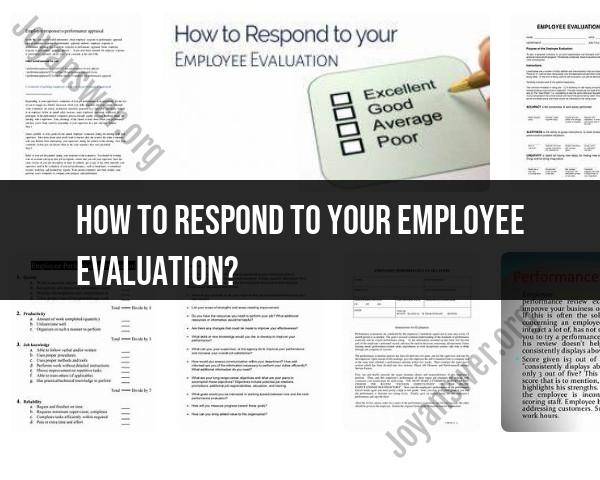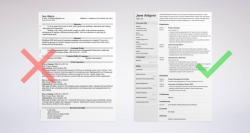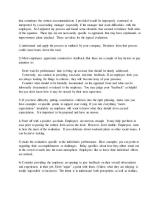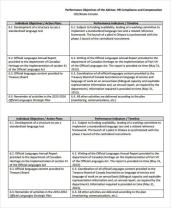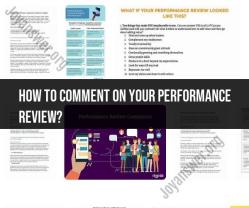How to respond to your employee evaluation?
Responding to your employee evaluation is an important opportunity to engage in constructive communication with your supervisor, understand their feedback, and discuss your performance. Here are some tips for responding to your employee evaluation:
Prepare in Advance:
- Before the meeting, review your own self-assessment and any goals or objectives you set for yourself. Consider how well you achieved those goals and gather examples of your accomplishments.
Stay Calm and Open-Minded:
- Approach the discussion with a calm and open-minded attitude. Keep in mind that the evaluation is a tool for improvement, and constructive feedback is an opportunity for growth.
Listen Actively:
- Allow your supervisor to share their feedback without interruption. Listen carefully to what they have to say, and make sure you understand their perspectives and expectations.
Ask Clarifying Questions:
- If there's something in the evaluation that you don't fully understand, don't hesitate to ask for clarification. Seek specific examples or instances to better understand the feedback.
Acknowledge Positives:
- If there are positive comments or recognition of your achievements, express gratitude and acknowledge the positive feedback. This can help maintain a positive and appreciative tone.
Take Ownership:
- Acknowledge areas where improvement is needed and take ownership of your performance. If there are areas where you fell short, express your commitment to addressing those issues and improving your performance.
Discuss Development Opportunities:
- Use the evaluation as an opportunity to discuss potential areas for professional development. Ask for guidance on how you can further develop your skills or knowledge to excel in your role.
Share Your Perspective:
- Provide your perspective on your performance and any challenges you may have faced during the evaluation period. Be honest about your experiences and any factors that may have affected your performance.
Set Goals for Improvement:
- Collaborate with your supervisor to set specific, measurable, and achievable goals for improvement. Discuss a plan of action and the support you may need to meet those goals.
Express Your Commitment:
- Conclude the discussion by expressing your commitment to your role and your dedication to continuous improvement. Reiterate your enthusiasm for contributing to the success of the team or organization.
Follow-Up:
- If there are action items or commitments made during the evaluation, follow up with your supervisor to provide updates on your progress. Regular communication about your development can reinforce your commitment to improvement.
Remember that employee evaluations are a two-way conversation, and your input is valuable. Approach the discussion with a focus on improvement, collaboration, and ongoing professional development.
Employee performance reviews: How to respond to your employee evaluation?
Employee performance reviews are a crucial part of the professional development process, providing employees with valuable feedback on their strengths, areas for improvement, and overall performance. Responding to your employee evaluation effectively can demonstrate your professionalism, commitment to growth, and ability to handle feedback constructively.
Guidance and best practices for employees in responding to performance evaluations
Here are some guidelines and best practices for employees in responding to performance evaluations:
Review the evaluation carefully: Take time to thoroughly review your evaluation, noting both positive feedback and areas for improvement.
Express gratitude: Start by expressing gratitude to your manager or reviewer for their feedback and time invested in assessing your performance.
Acknowledge positive feedback: Acknowledge and appreciate the positive feedback you have received. This demonstrates your self-awareness and willingness to accept positive reinforcement.
Address areas for improvement: For any areas identified for improvement, take ownership and show a commitment to addressing them. Ask for specific examples and clarify expectations.
Seek clarification: If there are any aspects of the evaluation that you don't fully understand, seek clarification from your manager or reviewer. This ensures that you have a clear understanding of their feedback and expectations.
Discuss goals and development plans: Initiate a discussion about setting specific and measurable goals for your future performance. This demonstrates your proactive approach to personal and professional development.
Propose action steps: Propose concrete action steps you plan to take to address identified areas for improvement. This shows your initiative and willingness to implement positive change.
Express commitment to growth: Reiterate your commitment to continuous improvement and professional development. This demonstrates your dedication to your role and the organization.
Tips for turning feedback into actionable steps for personal and professional development
Here are some tips for turning feedback into actionable steps for personal and professional development:
Identify specific areas for improvement: Break down feedback into specific and actionable items.
Set SMART goals: Set SMART (Specific, Measurable, Achievable, Relevant, and Time-bound) goals for each area of improvement.
Develop an action plan: Create a detailed action plan outlining the steps you will take to achieve each goal.
Seek support and guidance: Don't hesitate to seek support and guidance from your manager, colleagues, or mentors.
Track progress and make adjustments: Regularly monitor your progress and make adjustments to your action plan as needed.
Celebrate your achievements: Recognize and celebrate your accomplishments along the way to stay motivated.
By following these guidelines and tips, you can effectively respond to your employee evaluation, turning feedback into actionable steps for personal and professional growth. Remember, employee evaluations are an opportunity for self-reflection, learning, and continuous improvement.
